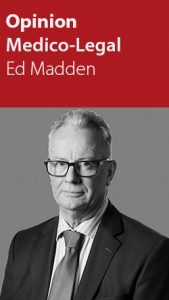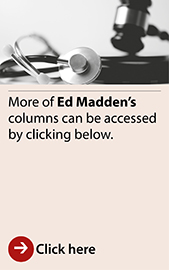Ed Madden, BL, looks at a recent England and Wales High Court case in which the Court allowed an appeal by the General Medical Council against a decision of the Medical Practitioners Tribunal imposing a period of suspension on a doctor’s registration as being unduly lenient
On June 20, 2025, the England and Wales High Court allowed an appeal by the General Medical Council (‘the GMC’) under the Medical Act 1983 (‘the Act’) against a decision of the Medical Practitioners Tribunal (‘the Tribunal’) imposing a sanction of 12 months suspension on a doctor’s registration as a medical practitioner, with a direction for a review to take place shortly before the end of that period.
 At the time of the events that gave rise to the regulatory proceedings against him, the doctor was the senior GP at the practice where he worked.
At the time of the events that gave rise to the regulatory proceedings against him, the doctor was the senior GP at the practice where he worked.
The allegations against him concerned his alleged conduct in respect of a female patient during a consultation in June 2019. She had attended the appointment complaining of ankle pain. She also requested contraception.
The GMC’s case against the doctor was that during the consultation he performed an examination of the patient’s breasts, back and chest during the course of which ‘he lifted her top, touched her back, turned her around from her hips, pushed her breasts out of her bra and squeezed her breasts’.
It was alleged that the doctor’s actions in performing the examination were not clinically indicated, but instead were sexually-motivated. The GMC maintained that this constituted professional misconduct by reason of which the doctor’s fitness to practise was impaired. The doctor, who had a long and unblemished career, strenuously denied the allegations.
In its appeal, the GMC contended that the sanction imposed by the Tribunal was insufficient for the protection of the public. They maintained that the appropriate and proportionate sanction was erasure of the doctor’s name from the register.
The High Court agreed and made an order quashing the decision of the Tribunal. The presiding judge gave as his provisional view that this was a case in which he should exercise the power conferred on him by section 40A(6)(c) of the Act, and direct that the doctor’s name be erased from the register.
However, he adjourned the hearing for 14 days to allow the parties to make any further submissions in writing they might wish to advance on the exercise of the powers conferred by section 40A(6)(c) and (d) of the Act, in the light of his judgment. Insofar as relevant, section 40A(6) provides as follows:
‘On an appeal under this section, the court may—
…
(c) substitute for the relevant decision any other decision which could have been made by the Tribunal; or
(d) remit the case to the MPTS [Medical Practitioners Tribunal Service] for them to arrange for a Medical Practitioners Tribunal to dispose of the case in accordance with the directions of the court…’
 When the matter returned to the Court on July 31, 2025, counsel for the GMC submitted that the findings of the Tribunal in this case provided ‘a clear and cogent steer towards erasure as the appropriate sanction’.
When the matter returned to the Court on July 31, 2025, counsel for the GMC submitted that the findings of the Tribunal in this case provided ‘a clear and cogent steer towards erasure as the appropriate sanction’.
In matters of sexual misconduct, the High Court was ‘likely to feel that it can assess what is needed to protect the public or maintain the reputation of the profession more easily for itself’ … .The only proportionate outcome that would properly reflect the gravity of the doctor’s misconduct, was erasure. No useful purpose would be served by remitting the case to the Tribunal. The Court should exercise the power conferred by section 40A(6)(c) of the Act and direct that the doctor’s name be erased from the register.
Counsel for the doctor submitted that the Court should remit the matter to the Tribunal for redetermination of the appropriate sanction under section 40A(6)(d) of the Act. The Tribunal is the specialist body established by the Act and entrusted by Parliament with the task of regulating the conduct of medical practitioners.
It was relevant that shortly before the expiry of the period of suspension from practice imposed on the doctor by the Tribunal, a differently constituted tribunal conducted a comprehensive review to assess his fitness to practise at that time. Following additional evidence and submissions, that tribunal determined that his fitness to practise was no longer impaired.
Fairness demanded that the doctor should have a further opportunity to present evidence to a differently constituted tribunal, thereby enabling them to assess his current insight, the question of remediation and risk and, in the light of that assessment, to determine the appropriate sanction.
Giving his judgment on sanction, the judge said that section 40A(6)(c) of the Act gives the Court on appeal the power to substitute for the Tribunal’s decision any other decision that could have been made by the Tribunal (including erasure).
He acknowledged that the Court should approach the exercise of that power with caution and should only do so ‘if confident as to what is the correct outcome’. If there is room for differences of opinion, particularly in the light of further submissions and additional evidence, the matter should be remitted to a newly constituted tribunal.
The judge said, however, that sufficiency of sanction for the protection of the public involves consideration of the health, safety and well-being of patients and the public.
It also involves consideration of the need to maintain public confidence in the profession, and proper professional standards and conduct for the profession.
When judged against each of those factors and overall, there was no doubt that the doctor’s behaviour was fundamentally incompatible with remaining in practice as a doctor. In the light of that conclusion, no useful purpose would be served by remitting the question of sanction to a reconstituted tribunal. This was accordingly an appropriate case for the Court to exercise the power granted by section 40A(6)(c) of the Act.
In directing that the doctor’s name be erased from the register, the judge said he recognised the devastating impact of his decision on the doctor after over 40 years of medical practice. However, ‘this was a deliberate and opportunistic sexual assault on a patient, an abuse of the doctor’s position of trust and power which was undertaken for his own sexual gratification’. ![]()
References: [2025] EWHC 1550 (Admin); [2025] EWHC 2039 (Admin)









